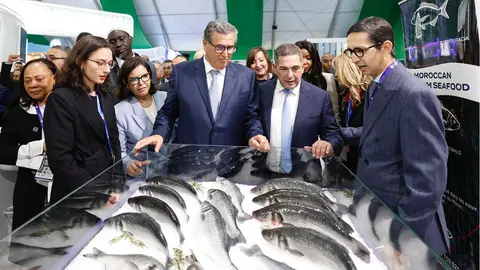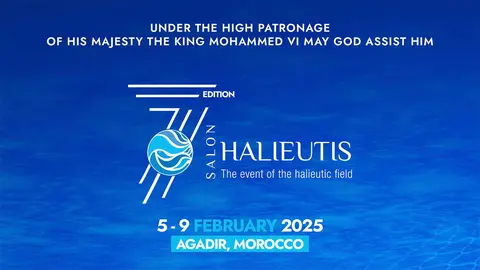Research and innovation, driving forces behind the development of the fishing industry in Africa

- Consolidating South-South cooperation
- Morocco and Russia: a continuously strengthening partnership
- Research, the key to the sustainability of fishery resources
- Innovation: a strategic lever
- France guest of honour at Halieutis
The Halieutis Fair currently being held in Agadir represents Morocco's commitment to research and innovation as a driving force for the sustainable development of the fishing industry, not only in Morocco but across the entire continent, according to Zakia Driouch, Secretary of State for Maritime Fishing.
This commitment is part of the Halieutis strategy which, since its launch in 2009, has enabled significant progress to be made in the modernisation and sustainability of activities related to fishing and aquaculture.
Driouch placed special emphasis on Morocco's willingness to support the sustainable development of fishing and aquaculture; the conservation of fishing resources; and the protection of marine ecosystems. The head of the Ministry of Fisheries underlined her commitment to developing an inclusive blue economy in Africa through the exchange of scientific and technical experiences among experts from the continent.
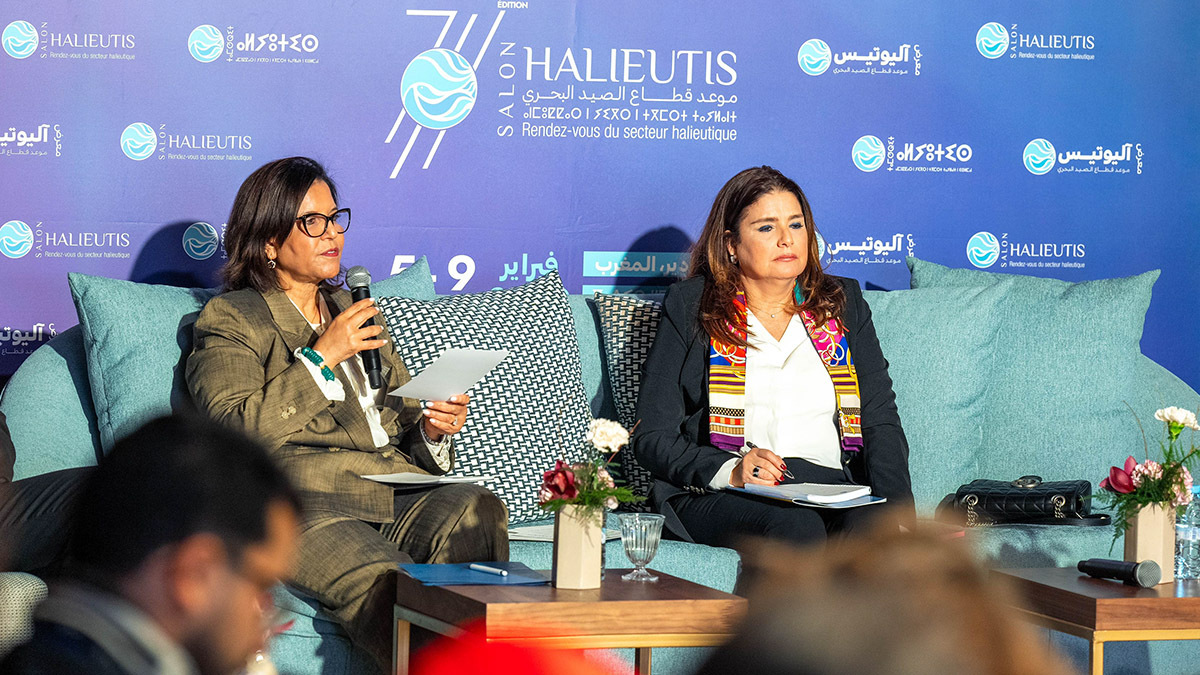
Consolidating South-South cooperation
Morocco is deploying different initiatives to consolidate its role as regional leader in the fishing sector and to promote mutually beneficial cooperation with African countries.
In the framework of the Halieutis Fair, whose seventh edition is being held until 9 February in Agadir, a series of bilateral meetings were held between Zakia Driouch and his African counterparts: Sidi Tiémoko Touré, Minister of Animal and Fisheries Resources of the Ivory Coast; Ahmed Hassan Adan, Minister of Fisheries Resources and Blue Economy of Somalia; and Syrielle Zora Kassa, Minister of Fisheries and the Sea of Gabon.
During these meetings, which aim to strengthen cooperative relations between Morocco and its African partners in the fields of maritime fishing and aquaculture, the African ministers praised Morocco's experience in the field of maritime fishing and expressed their willingness to strengthen partnerships with the Kingdom.
The meetings aim to identify actions and initiatives that could be implemented in the near future, in order to boost the sector and contribute to the socio-economic development of the continent. Strengthening South-South fisheries cooperation between Morocco, Côte d'Ivoire, Gabon and Somalia was one of the most important points of discussion.
Morocco also emphasised the importance of developing fishing cooperation with the Sultanate of Oman in areas such as maritime training, rescue, the control of fishing activities and the commercialisation of seafood.
Similarly, in his meeting with Fernando Andresen Guimaraes, director of International Ocean Governance and Sustainable Fisheries at the European Commission, Driouch emphasised the development of fisheries cooperation between Morocco and the European Union.
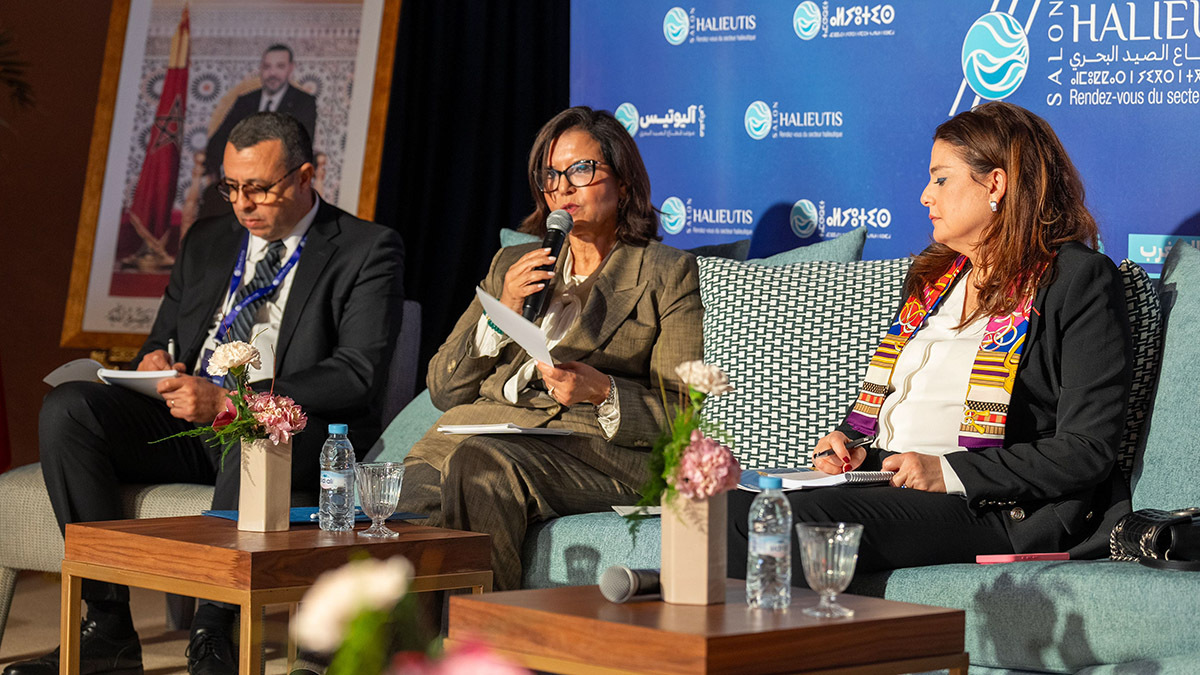
Morocco and Russia: a continuously strengthening partnership
Secretary of State Zakia Driouch also met with the president of the Russian Federal Agency for Fisheries, Ilya Shestakov. Both parties have praised the long history of relations between Morocco and Russia in the field of fishing, dating back to the 1960s, emphasising the importance of the successive agreements signed since 1992, which have allowed for fruitful and mutually beneficial collaboration.
During this meeting, both parties addressed new fishing agreements between the two countries, capable of serving the interests of both nations, on the one hand, and preserving fishing resources, on the other.
The Moroccan-Russian partnership seeks to strengthen bilateral relations between the two countries in general and scientific and technical cooperation in the fisheries sector in particular, such as the professional training of Moroccan seafarers, as well as the optimisation of fishing quotas and financial compensation.
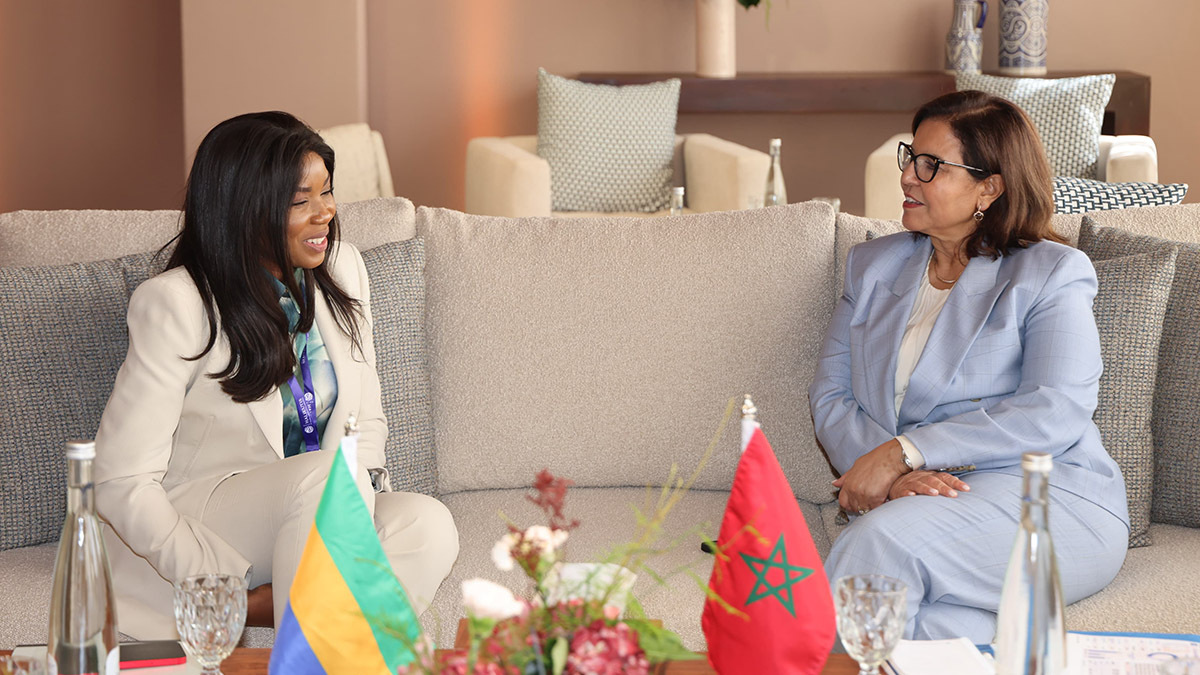
Research, the key to the sustainability of fishery resources
Zakia Driouch argued that ‘scientific research is the pillar of the national strategy for the development of the fisheries sector’ and pointed out that ‘with a global investment of 1.55 billion dirhams, Morocco has strengthened its scientific and technical capacities to better understand marine dynamics and anticipate environmental challenges, but it is still insufficient to respond to the challenges facing the sector’.
In this regard, the deputy minister explained the measures adopted by the Ministry to strengthen research infrastructures:
- The acquisition of the Al Hassan Marrakchi oceanographic vessel for 462 million dirhams.
- The commissioning of the launch Al Bahit (19 million dirhams) and the coastal vessel Ibn Sina 2 (34 million dirhams) allows for a more in-depth analysis of marine ecosystems and a better evaluation of fish stocks.
- The development of regional research centres, particularly in Tangiers, Amsa and Dakhla, for a total of 240 million dirhams.
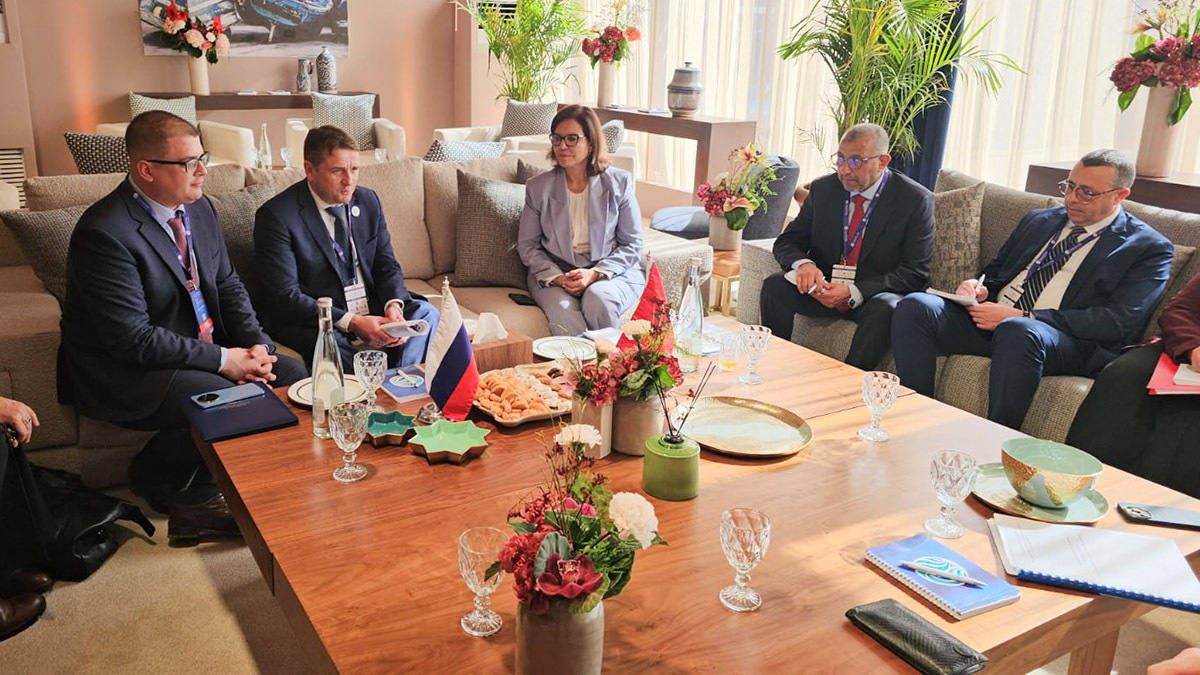
Innovation: a strategic lever
With the aim of achieving sustainable development of the fishing sector in both Morocco and Africa, innovation represents an essential strategic lever for sustainable management. Integrating new technologies into the sector's different operations and processes will help to improve quality and reduce risks.
One example of this is the use of artificial intelligence (AI) to monitor fish stocks in real time and predict the impacts of climate change in order to take a proactive approach to environmental threats. Other technologies are used in the creation of innovative fishing gear, including biodegradable materials that help to reduce marine pollution.
As for the valorisation of seafood, Innovative Product Banks can be created, proposing project models to develop products with high added value. In this sense, diversifying aquaculture production makes it possible to reinforce the sustainability of projects, as well as to optimise the economic performance of the sector by supporting 450 aquaculture projects, of which 123 are of a social nature.
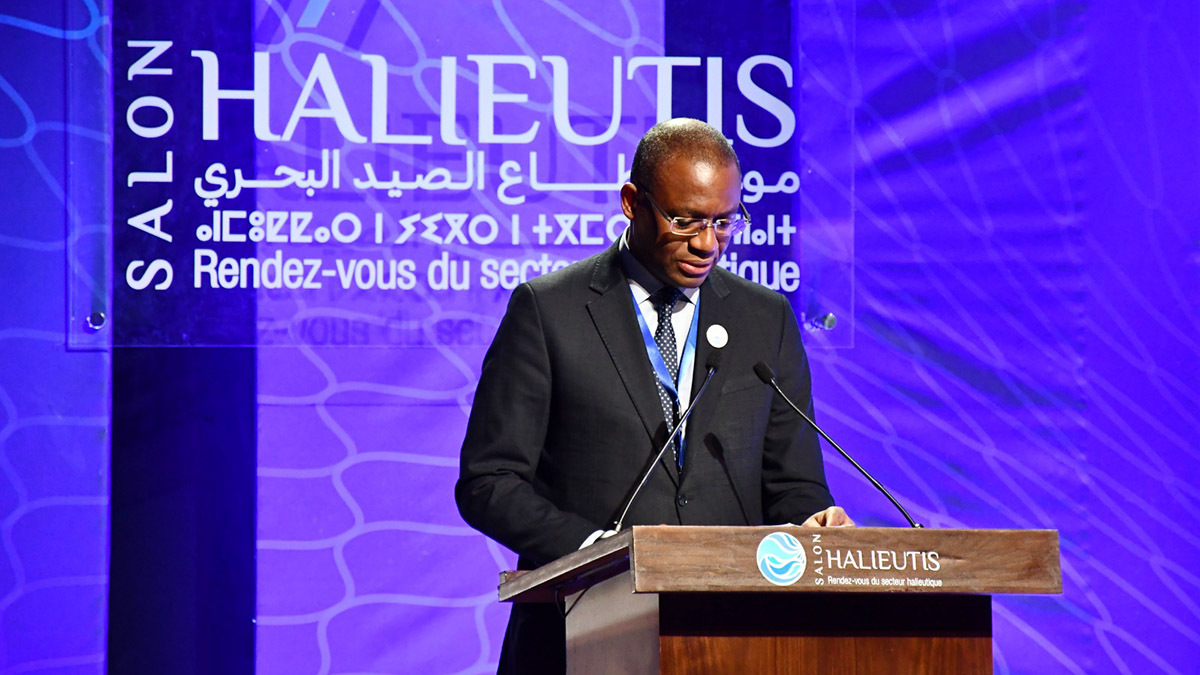
France guest of honour at Halieutis
The seventh edition of Halieutis has had France, a strategic partner of Morocco, as guest of honour. This choice illustrates the historical and strategic relations between Morocco and France in areas of common interest such as the blue economy, the sustainable management of marine resources and the development of fishing technologies.
This choice is due to the following seven reasons:
- Strong bilateral relations with Morocco.
- Strategic partnerships and dynamic trade exchanges in the fishing sector.
- France is the third largest customer of Moroccan fishing products (4% of the value of exports).
- Its experience and progress in the fishing, aquaculture and fishing research sectors.
- A global maritime and economic power.
- A transcontinental nation that benefits from the second largest exclusive economic zone (EEZ) in the world, with a maritime surface area of 11 million km2, spread over three oceans.
- Its coastline extends over 5,853 km in the metropolis and 15,945 km including overseas territories.
- In 2024, it ranked 12th in the world in the global innovation index thanks to investments in research and development (R&D).
- First-rate fishing expertise.
- The second largest producer of fisheries and aquaculture in the European Union, with a production of 735,000 tonnes, which represents 14% of the EU's total volume.
- A pioneering country in marine aquaculture, ranking second in Europe and 29th in the world.

